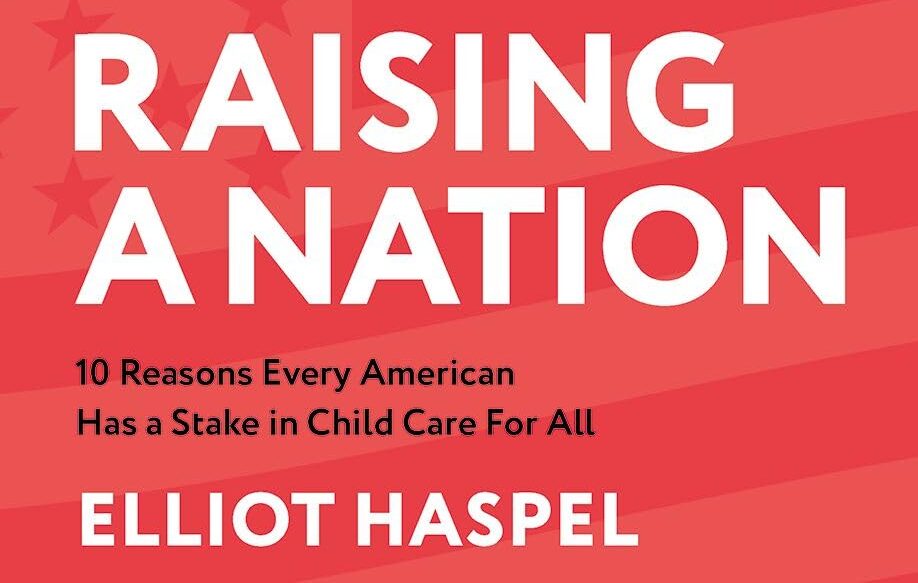
"Building a community without a childcare is like building on sand."
- Elliot Haspel
As Executive Director of ElevatEd, I grapple each day with one central question: How can we maximize the power of early childhood Jewish education to help families discover belonging, purpose, and lifelong connection, thereby securing a thriving Jewish community for the future?
This question led me to sit down with Elliot Haspel, a nationally recognized child and family policy expert and commentator with expertise in child care and the intersection between early childhood and climate change. We focused on his new book, Raising a Nation: 10 Reasons Every American Has a Stake in Child Care for All (Oxford University Press, 2025), and its urgent relevance to Jewish communities across America.
Our exchange highlighted a fundamental reality: Jewish communal life cannot thrive unless we invest seriously in early childhood.
See the full interview here
If We Build on Bedrock, We Create Lasting Communities
Communities flourish when they provide robust, high-quality early childhood experiences. Where communities fail to offer these foundational experiences, families lack places to learn and grow, and the future of Jewish communal life stands on unsteady ground. As Elliot reminded me, "If the early years lay the foundation for Jewish education and for Jewish values, then helping families be able to be fully present in those years is imperative for anyone who cares about strong Jewish community… Building a community without a childcare is like building on sand.”
Starting Young in the US System
Jewish tradition emphasizes chinuch (education) beginning at age three, well ahead of the typical age five start to American formal education. Neuroscience demonstrates that learning starts before birth. We hold communal responsibility to lay the foundations for Jewish identity, empathy, and social-emotional growth long before kindergarten through relationships and intentional care.
Today’s U.S. childcare system presents immense challenges. Many parents juggle work shifts and unreliable care, straining both parent-child and partner relationships. This stress often leaves them unable to participate fully in Jewish life, which leads to isolation and weakens communal ties. Scarcity of seats in early childhood centers, the high cost of care, and structural barriers force parents to focus on surviving the early years which leaves little capacity for communal connection or cultural and religious participation.
Cohesion and Connection: Beyond Childcare
Jewish early childhood centers offer much more than holiday celebrations and Shabbat songs. These centers nurture cognitive development, cultivate Jewish identity, and strengthen children’s sense of belonging. Families also benefit: early childhood centers serve as gateways into Jewish communal life, helping parents form lasting social bonds and connect to key institutions. By designing intentional curricula and prioritizing relationships, these programs spur sustained engagement in Jewish learning and participation across the lifespan.
As described above, many families encounter significant challenges when they try to build or sustain adult relationships while raising young children. In our conversation, we explored the ways that close-knit Orthodox communities use early childhood settings to foster both friendships and networks of reciprocal support among parents. In contrast, families in secular suburban contexts often describe fragmented social ties and experiences of isolation, which stem from competing work and family demands. When families do not have access to robust early childhood centers, they lose avenues for connection, and their communal bonds weaken, decreasing the likelihood of future collective engagement.
Scarcity Hurts Everyone
Jewish early childhood education varies widely by region. While some communities have long waitlists, especially for infant care, others struggle because schools are located too far from neighborhoods where young families live or charge prohibitively high tuition. Elliot notes that although some families move to cities with better childcare, most settle for affordable, accessible options outside the Jewish community, even if those programs lack Jewish resonance or the quality they’d prefer.
Today, only a minority of Jewish families, sometimes as low as 6% in ElevatEd communities, enroll in Jewish early childhood education because options are limited, costs are high, and locations are inconvenient. When families who wish to enroll cannot secure a seat, they often feel excluded and unsupported, which diminishes their future community engagement. Every empty seat in early childhood programs represents a future empty seat in synagogue, fewer campers, volunteers, donors, and a loss of communal vitality.
Quality, Retention, and Policy Matter
We know that program quality and workforce stability go hand in hand. As Elliot emphasized, “One thing we know for sure is that without a stable workforce, without a stable educator force, you can’t have a quality program, because that churn affects the child-caregiver relationship.” True pay parity, mentorship, and career support for educators serve as urgent moral imperatives.
Cities like Washington, D.C. and Vermont demonstrate that public investment can expand childcare, reduce costs, and improve quality. ElevatEd, in partnership with private funders such as Jewish Federations and family foundations, strengthens early childhood Jewish education and encourages advocacy. By combining private and public investment, we can amplify impact and ensure a strong communal future.
The Ephemeral Community vs. Lasting Legacy
When we fail to offer abundant, high-quality, and inclusive early childhood options, families look elsewhere. We must decide: Will we build a foundation that allows every child and family to establish deep roots, or allow our community to diminish over time?
Moving Forward—What We Must Do
Invest substantially in Jewish early childhood education infrastructure, educator compensation, and support for families.
Why Our Choices Matter
Elliot’s words capture the stakes: “Do we want a society where families thrive and share values in faith communities, or one where childcare is scarce, stressful, and pay-to-play?” Jewish early childhood education forms the foundation for learning, belonging, and continuity. The choices we make today—grounded in care and community—shape the legacy our community will inherit tomorrow.